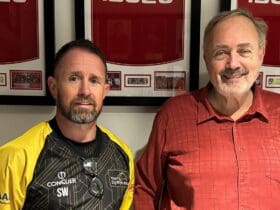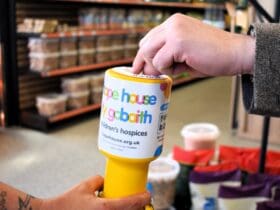A 22-year-old entrepreneur from Anglesey has been helping neurodivergent youngsters with the launch of a specialist support and education agency.
Rebecca Bowyer, from Anglesey, launched Be Heard Communications in July 2022 with the support of Big Ideas Wales, with a mission to educate more people on neurodiversity.
Rebecca, who was diagnosed with dyslexia at the age of eight and then autism 10 years later, has been hosting free neurodivergent training sessions for student nurses at Bangor University. By helping new nurses to better understand neurodivergent conditions, recognise neurodiverse patients and the best ways to support individuals who are neurodivergent, Rebecca hopes to make healthcare settings more inviting for people like herself.
Alongside training student nurses, Rebecca offers one-on-one support sessions to learners who are struggling to navigate education with conditions like dyslexia, ADHD or autism. During hourly sessions, conducted in person and via webchats, Rebecca sets out to understand her clients’ condition and individual tendencies, before helping them to implement coping mechanisms into their revision schedules and wider day-to-day routines that can aid them in achieving their academic goals.
Rebecca, who recently graduated with a first-class honours in business management and marketing from Bangor University, said: “It’s frightening how much misinformation is circulated about neurodivergent conditions. Teachers often mistake focus mechanisms with fidgeting, and nurses assume meltdowns are just tantrums. I’ve been told off for not paying attention when avoiding eye contact, and have been asked, more than once, ‘what do you want me to do about it?’ when making a nurse aware of my conditions.
“For a long time I felt really angry and sad that people with neurodiverse conditions are mistreated because of something we can’t control. That’s why I set out to become an advocate for neurodiversity.”
While Be Heard Communications officially launched in 2022, Rebecca has been posting weekly blogs on her website for over three years on topics such as navigating higher education with a disability, workplace adjustments employers can make for neurodiverse staff, and signs a neurodiverse student is struggling.
As a student at Bangor University, Rebecca received support from the B-Enterprising team to develop her business idea and later launched Be Heard Communications with assistance from Big Ideas Wales,
a Welsh Government funded service that, as part of Business Wales, aims to support anyone between the age of five and 25 to develop a business idea, including students and graduates, as part of its commitment to the Young Person’s Guarantee.
In July, Rebecca was introduced to business advisor, Julie Williams, who has supported Rebecca in developing her business by implementing and completing a series of small, manageable goals that help her to step outside of her comfort zone and grow Be Heard Communications.
Since working with Big Ideas Wales, Rebecca has built a business plan, registered as an independent business, and grown her social following. She also attended Big Ideas Wales’ Bootcamp to Business event last October, where she took part in entrepreneurial workshops, heard from thriving businesspeople, and presented her business to a panel of judges.
Discussing Rebecca’s growth as an entrepreneur, Julie said: “When Rebecca first joined Big Ideas Wales, she would never have considered attending an event like Bootcamp to Business. Now, she’s attended multiple events and has even become a Big Ideas Wales Role Model, offering support and advice to other neurodivergent entrepreneurs and her business is thriving. I’m proud to be a helping hand as she helps others to recognise, support and navigate neurodiversity in their professional and social lives.”
In the coming months Rebecca hopes to begin working with teachers and tutors in local schools and colleges, providing them with the additional skills and knowledge to recognise and assist learners who are struggling to achieve their academic potential due to neurodiversity.









Leave a Reply
View Comments